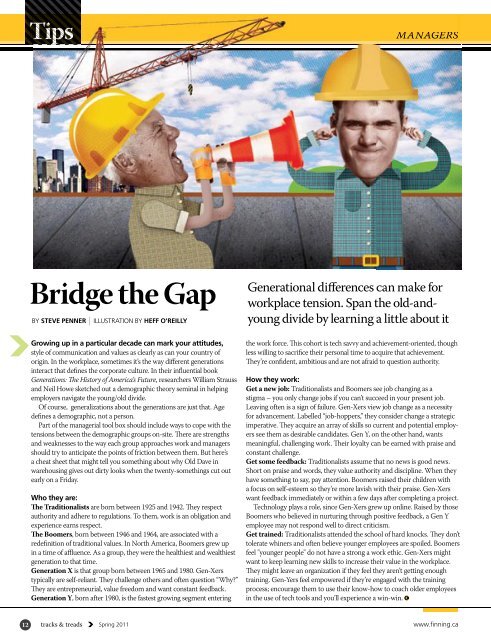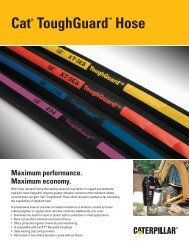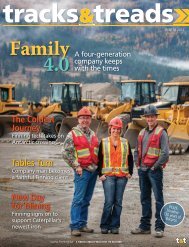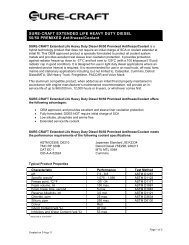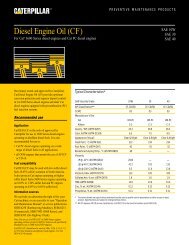Water: Logged Ply the River Company Secret - Finning Canada
Water: Logged Ply the River Company Secret - Finning Canada
Water: Logged Ply the River Company Secret - Finning Canada
You also want an ePaper? Increase the reach of your titles
YUMPU automatically turns print PDFs into web optimized ePapers that Google loves.
TipsMANAGERSBridge <strong>the</strong> GapBY STEVE PENNERILLUSTRATION BY HEFF O'REILLYGrowing up in a particular decade can mark your attitudes,style of communication and values as clearly as can your country oforigin. In <strong>the</strong> workplace, sometimes it’s <strong>the</strong> way different generationsinteract that defines <strong>the</strong> corporate culture. In <strong>the</strong>ir influential bookGenerations: The History of America’s Future, researchers William Straussand Neil Howe sketched out a demographic <strong>the</strong>ory seminal in helpingemployers navigate <strong>the</strong> young/old divide.Of course, generalizations about <strong>the</strong> generations are just that. Agedefines a demographic, not a person.Part of <strong>the</strong> managerial tool box should include ways to cope with <strong>the</strong>tensions between <strong>the</strong> demographic groups on-site. There are strengthsand weaknesses to <strong>the</strong> way each group approaches work and managersshould try to anticipate <strong>the</strong> points of friction between <strong>the</strong>m. But here’sa cheat sheet that might tell you something about why Old Dave inwarehousing gives out dirty looks when <strong>the</strong> twenty-somethings cut outearly on a Friday.Who <strong>the</strong>y are:The Traditionalists are born between 1925 and 1942. They respectauthority and adhere to regulations. To <strong>the</strong>m, work is an obligation andexperience earns respect.The Boomers, born between 1946 and 1964, are associated with aredefinition of traditional values. In North America, Boomers grew upin a time of affluence. As a group, <strong>the</strong>y were <strong>the</strong> healthiest and wealthiestgeneration to that time.Generation X is that group born between 1965 and 1980. Gen-Xerstypically are self-reliant. They challenge o<strong>the</strong>rs and often question “Why?”They are entrepreneurial, value freedom and want constant feedback.Generation Y, born after 1980, is <strong>the</strong> fastest growing segment enteringGenerational differences can make forworkplace tension. Span <strong>the</strong> old-andyoungdivide by learning a little about it<strong>the</strong> work force. This cohort is tech savvy and achievement-oriented, thoughless willing to sacrifice <strong>the</strong>ir personal time to acquire that achievement.They’re confident, ambitious and are not afraid to question authority.How <strong>the</strong>y work:Get a new job: Traditionalists and Boomers see job changing as astigma – you only change jobs if you can’t succeed in your present job.Leaving often is a sign of failure. Gen-Xers view job change as a necessityfor advancement. Labelled “job-hoppers,” <strong>the</strong>y consider change a strategicimperative. They acquire an array of skills so current and potential employerssee <strong>the</strong>m as desirable candidates. Gen Y, on <strong>the</strong> o<strong>the</strong>r hand, wantsmeaningful, challenging work. Their loyalty can be earned with praise andconstant challenge.Get some feedback: Traditionalists assume that no news is good news.Short on praise and words, <strong>the</strong>y value authority and discipline. When <strong>the</strong>yhave something to say, pay attention. Boomers raised <strong>the</strong>ir children witha focus on self-esteem so <strong>the</strong>y’re more lavish with <strong>the</strong>ir praise. Gen-Xerswant feedback immediately or within a few days after completing a project.Technology plays a role, since Gen-Xers grew up online. Raised by thoseBoomers who believed in nurturing through positive feedback, a Gen Yemployee may not respond well to direct criticism.Get trained: Traditionalists attended <strong>the</strong> school of hard knocks. They don’ttolerate whiners and often believe younger employees are spoiled. Boomersfeel "younger people" do not have a strong a work ethic. Gen-Xers mightwant to keep learning new skills to increase <strong>the</strong>ir value in <strong>the</strong> workplace.They might leave an organization if <strong>the</strong>y feel <strong>the</strong>y aren’t getting enoughtraining. Gen-Yers feel empowered if <strong>the</strong>y’re engaged with <strong>the</strong> trainingprocess; encourage <strong>the</strong>m to use <strong>the</strong>ir know-how to coach older employeesin <strong>the</strong> use of tech tools and you’ll experience a win-win.12 tracks & treads Spring 2011www.finning.ca


